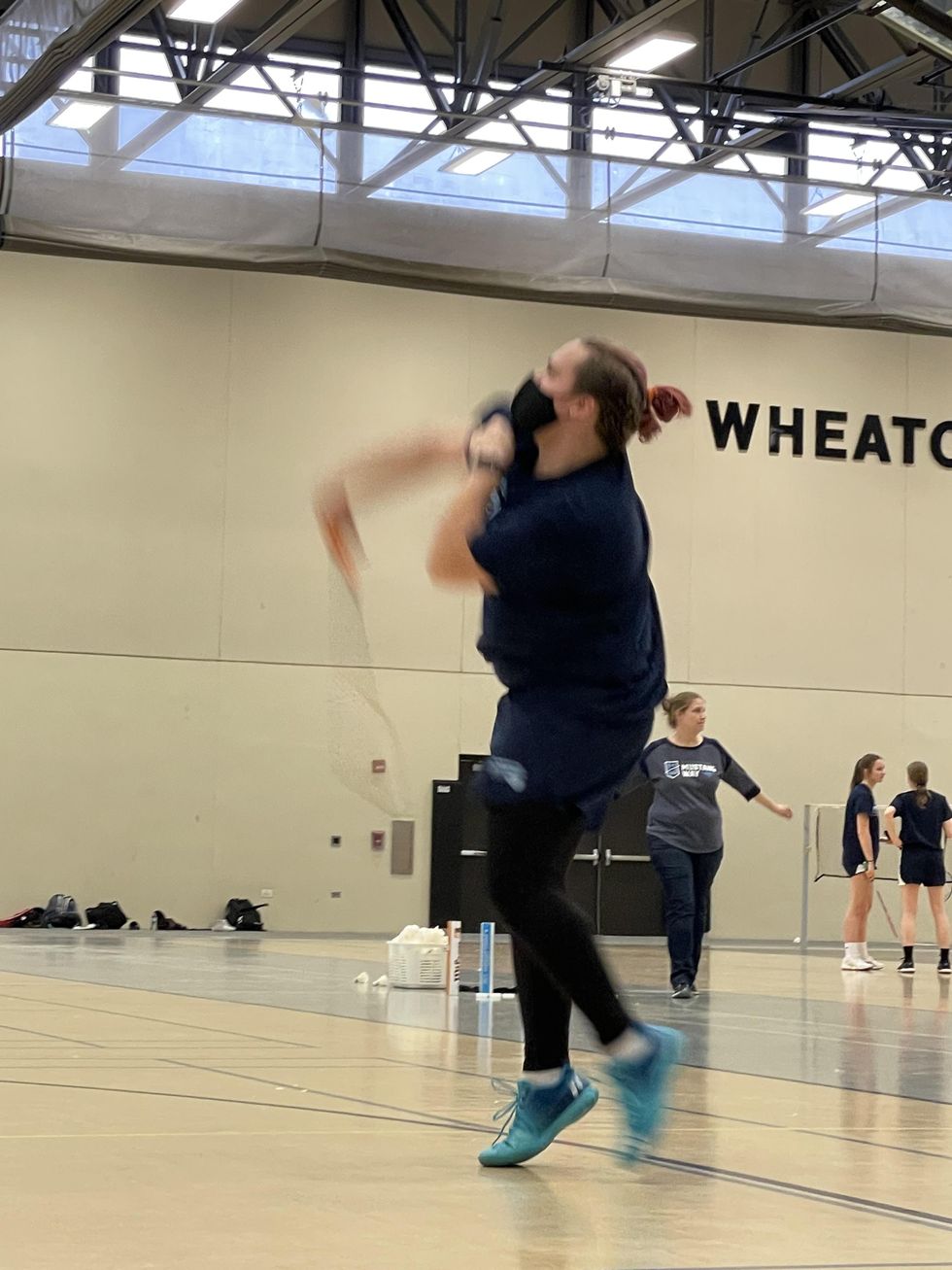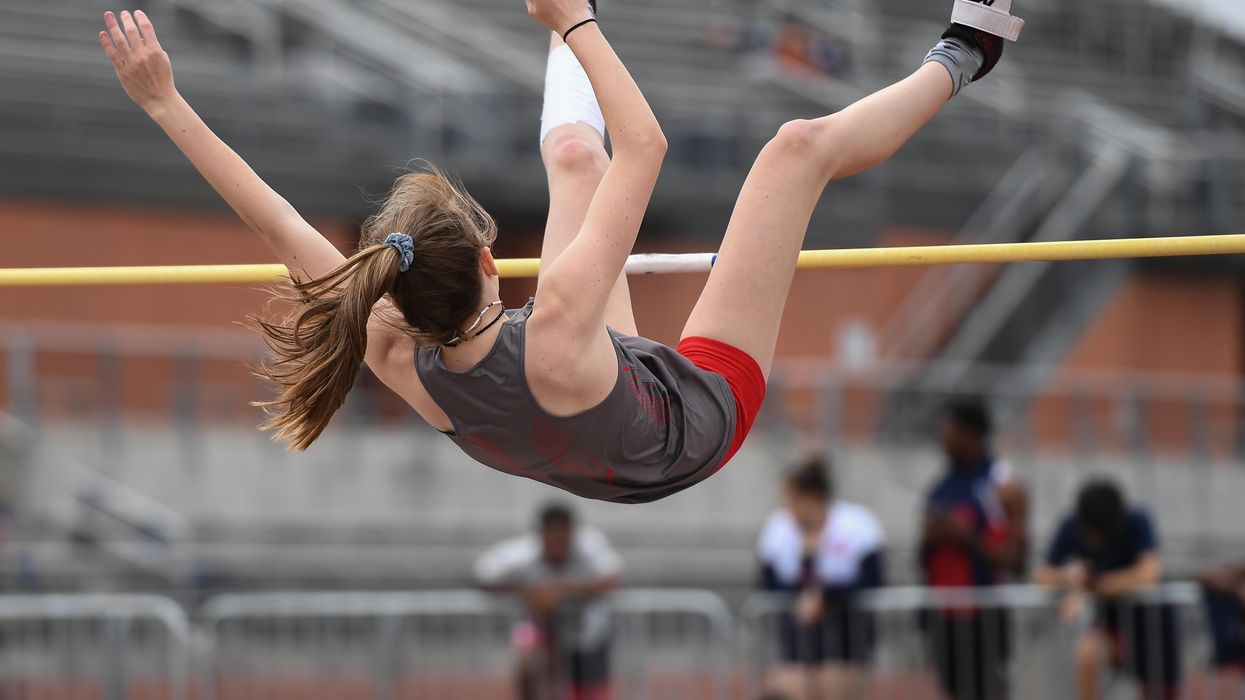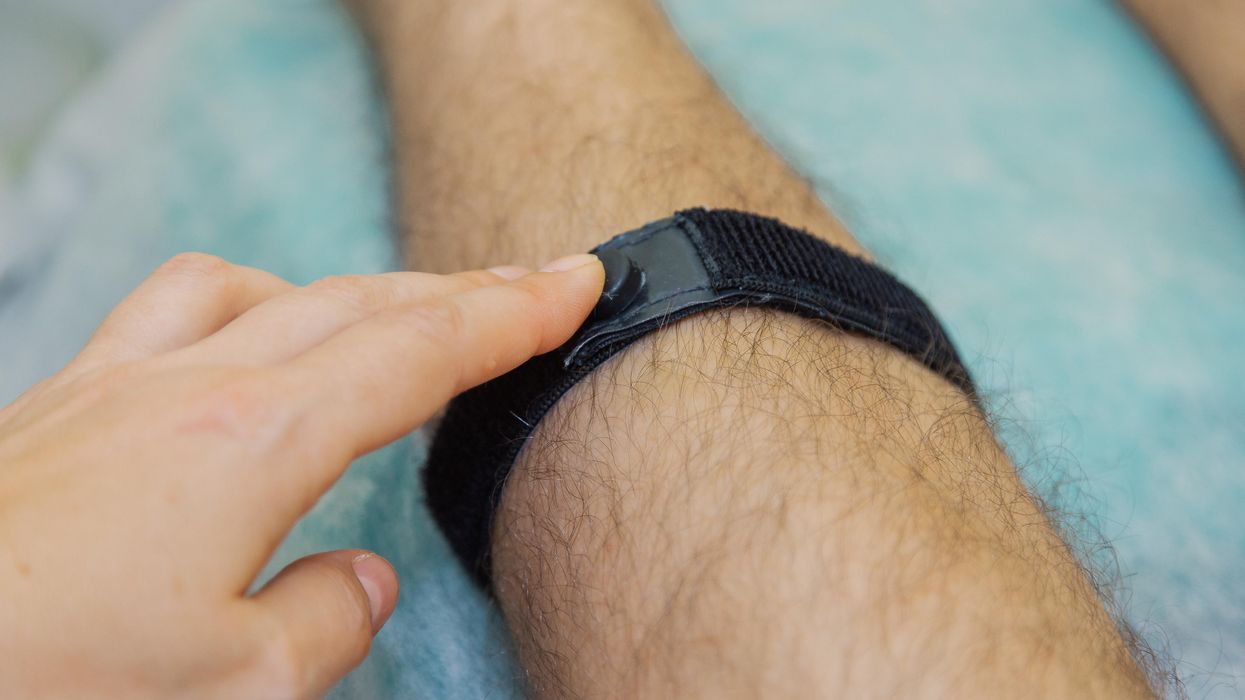My Parents Raised Me to Be a Science Denier, So I Educated Myself

A religious family attends church.
The Internet has made it easier than ever to misguide people. The anti-vaxx movement, climate change denial, protests against stem cell research, and other movements like these are rooted in the spread of misinformation and a distrust of science.
"I had been taught intelligent design and young-earth creationism instead of evolution, geology, and biology."
Science illiteracy is pervasive in the communities responsible for these movements. For the mainstream, the challenge lies not in sharing the facts, but in combating the spread of misinformation and facilitating an open dialogue between experts and nonexperts.
I grew up in a household that was deeply skeptical of science and medicine. My parents are evangelical Christians who believe the word of the Bible is law. To protect my four siblings and me from secular influence, they homeschooled some of us and put the others in private Christian schools. When my oldest brother left for a Christian college and the tuition began to add up, I was placed in a public charter school to offset the costs.
There, I became acutely aware of my ignorant upbringing. I had been taught intelligent design and young-earth creationism instead of evolution, geology, and biology. My mother skipped over world religions, and much of my history curriculum was more biblical-based than factual. She warned me that stem cell research, vaccines, genetic modification of crops, and other areas of research in biological science were examples of humans trying to be like God. At the time, biologist Richard Dawkins' The God Delusion was a bestseller and science seemed like an excuse to not believe in God, so she and my father discouraged me from studying it.
The gaps in my knowledge left me feeling frustrated and embarrassed. The solution was to learn about the things that had been censored from my education, but several obstacles stood in the way.
"When I first learned about fundamentalism, my parents' behavior finally made sense."
I lacked a good foundation in basic mathematics after being taught by my mother, who never graduated college. My father, who holds a graduate degree in computer science, repeatedly told me that I inherited my mother's "bad math genes" and was therefore ill-equipped for science. While my brothers excelled at math under his supervision and were even encouraged toward careers in engineering and psychology, I was expected to do well in other subjects, such as literature. When I tried to change this by enrolling in honors math and science classes, they scolded me -- so reluctantly, I dropped math. By the time I graduated high school, I was convinced that math and science were beyond me.
When I look back at my high school transcripts, that sense of failure was unfounded: my grades were mostly A's and B's, and I excelled in honors biology. Even my elementary standardized test scores don't reflect a student disinclined toward STEM, because I consistently scored in the top percentile for sciences. Teachers often encouraged me to consider studying science in college. Why then, I wondered, did my parents reject that idea? Why did they work so hard to sway me from that path? It wasn't until I moved away from my parents' home and started working to put myself through community college that I discovered my passion for both biology and science writing.
As a young adult venturing into the field of science communication, I've become fascinated with understanding communities that foster antagonistic views toward science. When I first learned about fundamentalism, my parents' behavior finally made sense. It is the foundation of the Religious Right, a right-wing Christian group which heavily influences the Republican party in the United States. The Religious Right crusades against secular education, stem cell research, abortion, evolution, and other controversial issues in science and medicine on the basis that they contradict Christian beliefs. They are quietly overturning the separation of church and state in order to enforce their religion as policy -- at the expense of science and progress.
Growing up in this community, I learned that strong feelings about these issues arise from both a lack of science literacy and a distrust of experts. Those who are against genetic modification of crops don't understand that GMO research aims to produce more, and longer-lasting, food for a growing planet. The anti-vaxx movement is still relying on a deeply flawed study that was ultimately retracted. Those who are against stem cell research don't understand how it works or the important benefits it provides the field of medicine, such as discovering new treatment methods.
In fact, at one point the famous Christian radio show Focus on the Family spread anti-vaxx mentality when they discussed vaccines that, long ago, were derived from aborted fetal cells. Although Focus on the Family now endorses vaccines, at the time it was enough to convince my own mother, who listened to the show every morning, not to vaccinate us unless the law required it.
"In everyday interactions with skeptics, science communicators need to shift their focus from convincing to discussing."
We can help clear up misunderstandings by sharing the facts, but the real challenge lies in willful ignorance. It was hard for me to accept, but I've come to understand that I'm not going to change anyone's mind. It's up to an individual to evaluate the facts, consider the arguments for and against, and make his or her own decision.
As my parents grew older and my siblings and I introduced them to basic concepts in science, they came around to trusting the experts a little more. They now see real doctors instead of homeopathic practitioners. They acknowledge our world's changing climate instead of denying it. And they even applaud two of their children for pursuing careers in science. Although they have held on to their fundamentalism and we still disagree on many issues, these basic changes give me hope that people in deeply skeptical communities are not entirely out of reach.
In everyday interactions with skeptics, science communicators need to shift their focus from convincing to discussing. This means creating an open dialogue with the intention of being understanding and helpful, not persuasive. This approach can be beneficial in both personal and online interactions. There are people within these movements who have doubts, and their doubts will grow as we continue to feed them through discussion.
People will only change their minds when it is the right time for them to do so. We need to be there ready to hold their hand and lead them toward truth when they reach out. Until then, all we can do is keep the channels of communication open, keep sharing the facts, and fight the spread of misinformation. Science is the pursuit of truth, and as scientists and science communicators, sometimes we need to let the truth speak for itself. We're just there to hold the megaphone.
Debates over transgender athletes rage on, with new state bans and rules for Olympians, NCAA sports
Some argue that transgender females should be banned from competing with women in sports, while others think such bans are unfair, as the NCAA and other organizations try to keep up with research on how testosterone affects performance.
Ashley O’Connor, who was biologically male at birth but identifies as female, decided to compete in badminton as a girl during her senior year of high school in Downers Grove, Illinois. There was no team for boys, and a female friend and badminton player “practically bullied me into joining” the girls’ team. O’Connor, who is 18 and taking hormone replacement therapy for her gender transition, recalled that “it was easily one of the best decisions I have ever made.”
She believes there are many reasons why it’s important for transgender people to have the option of playing sports on the team of their choice. “It provides a sense of community,” said O’Connor, now a first-year student concentrating in psychology at the College of DuPage in Glen Ellyn, Illinois.
“It’s a great way to get a workout, which is good for physical and mental health,” she added. She also enjoyed the opportunity to be competitive, learn about her strengths and weaknesses, and just be normal. “Trans people have friends and trans people want to play sports with their friends, especially in adolescence,” she said.
However, in 18 states, many of which are politically conservative, laws prohibit transgender students from participating in sports consistent with their gender identity, according to the Movement Advancement Project, an independent, nonprofit think tank based in Boulder, Colo., that focuses on the rights of LGBTQ people. The first ban was passed in Idaho in 2020, although federal district judges have halted this legislation and a similar law in West Virginia from taking effect.
Proponents of the bans caution that transgender females would have an unfair biological advantage in competitive school sports with other girls or women as a result of being born as stronger males, potentially usurping the athletic accomplishments of other athletes.
“The future of women’s sports is at risk, and the equal rights of female athletes is being infringed,” said Penny Nance, CEO and president of Concerned Women for America, a legislative action committee in D.C. that seeks to impact culture to promote religious values.
“As the tidal wave of gender activism consumes sports from the Olympics on down, a backlash is being felt as parents are furious about the disregard for their daughters who have worked very hard to achieve success as athletes,” Nance added. “Former athletes, whose records are being shattered, are demanding answers.”
Meanwhile, opponents of the bans contend that they bar transgender athletes from playing sports with friends and learning the value of teamwork and other life lessons. These laws target transgender girls most often in kindergarten through high school but sometimes in college as well. Many local schools and state athletic associations already have their own guidelines “to both protect transgender people and ensure a level playing field for all athletes,” according to the Movement Advancement Project’s website. But statewide bans take precedence over these policies.
"It’s easy to sympathize on some level with arguments on both sides, and it’s likely going to be impossible to make everyone happy,” said Liz Joy, a past president of the American College of Sports Medicine.
In January, the National Collegiate Athletic Association (NCAA), based in Indianapolis, tried to sort out the controversy by implementing a new policy. It requires transgender students participating in female sports to prove that they’ve been taking treatments to suppress testosterone for at least one year before competition, as well as demonstrating that their testosterone level is sufficiently low, depending on the sport, through a blood test.
Then, in August, the NCAA clarified that these athletes also must take another blood test six months after their season has started that shows their testosterone levels aren’t too high. Additional guidelines will take effect next August.
Even with these requirements, “there is no plan that is going to be considered equitable and fair to all,” said Bradley Anawalt, an endocrinologist at the University of Washington School of Medicine. Biologically, he noted, there is still some evidence that a transgender female who initiates hormone therapy with estrogen and drops her testosterone to very low levels may have some advantage over other females, based on characteristics such as hand and foot size, height and perhaps strength.
Liz Joy, a past president of the American College of Sports Medicine, agrees that allowing transgender athletes to compete on teams of their self-identifying gender poses challenges. “It’s easy to sympathize on some level with arguments on both sides, and it’s likely going to be impossible to make everyone happy,” said Joy, a physician and senior medical director of wellness and nutrition at Intermountain Healthcare in Salt Lake City, Utah. While advocating for inclusion, she added that “sport was incredibly important in my life. I just want everyone to be able to benefit from it.”
One solution may be to allow transgender youth to play sports in a way that aligns with their gender identity until a certain age and before an elite level. “There are minimal or no potential financial stakes for most youth sports before age 13 or 14, and you do not have a lot of separation in athlete performance between most boys and girls until about age 13,” said Anwalt, who was a reviewer of the Endocrine Society’s national guidelines on transgender care.
Myron Genel, a professor emeritus and former chief of pediatric endocrinology at Yale School of Medicine, said it’s difficult to argue that height gives transgender females an edge because in some sports tall women already dominate over their shorter counterparts.
He added that the decision to allow transgender females to compete with other girls or women could hinge on when athletes began taking testosterone blockers. “If the process of conversion from male to female has been undertaken in the early stages of puberty, from my perspective, they have very little unique advantage,” said Genel, who advised the International Olympic Committee (IOC), based in Switzerland, on testosterone limits for transgender athletes.
Because young athletes’ bodies are still developing, “the differences in natural abilities are so massive that they would overwhelm any advantage a transgender athlete might have,” said Thomas H. Murray, president emeritus of The Hastings Center, a pioneering bioethics research institute in Garrison, New York, and author of the book “Good Sport,” which focuses on the ethics and values in the Olympics and other competitions.
“There’s no good reason to limit the participation of transgender athletes in the sports where male athletes don’t have an advantage over women,” such as sailing, archery and shooting events, Murray said. “The burden of proof rests on those who want to restrict participation by transgender athletes. They must show that in this sport, at this level of competition, transgender athletes have a conspicuous advantage.”
Last year, the IOC issued a new framework emphasizing that the Olympic rules related to transgender participation should be specific to each sport. “This is an evolving topic and there has been—as it will continue to be—new research coming out and new developments informing our approach,” and there’s currently no consensus on how testosterone affects performance across all sports, an IOC spokesperson told Leaps.org.
Many of the new laws prohibiting transgender people from competing in sports consistent with their gender identity specifically apply to transgender females. Yet, some experts say the issue also affects transgender males, nonbinary and intersex athletes.
“There has been quite a bit of attention paid to transgender females and their participation in biological female sports and almost minimal focus on transgender male competition in male sports or in any sports,” said Katherine Drabiak, associate professor of public health law and medical ethics at University of South Florida in Tampa. In fact, “transgender men, because they were born female, would be at a disadvantage of having less lean body mass, less strength and less muscular area as a general category compared to a biological male.”
While discussing transgender students’ participation in sports, it’s important to call attention to the toll that anti-transgender legislation can take on these young people’s well-being, said Jonah DeChants, a research scientist at The Trevor Project, a suicide prevention and mental health organization for LGBTQ youth. Recent polling found that 85 percent of transgender and nonbinary youth said that debates around anti-transgender laws had a negative impact on their mental health.
“The reality is simple: Most transgender girls want to play sports for the same reasons as any student—to benefit their health, to have fun, and to build connection with friends,” DeChants said. According to a new peer-reviewed qualitative study by researchers at The Trevor Project, many trans girls who participated in sports experienced harassment and stigma based on their gender identity, which can contribute to poor mental health outcomes and suicide risk.

In addition to badminton, O'Connor played other sports such as volleyball, and she plans to become an assistant coach or manager of her old high school's badminton team.
Ashley O'Connor
However, DeChants added, research also shows that young people who reported living in an accepting community, had access to LGBTQ-affirming spaces, or had social support from family and friends reported significantly lower rates of attempting suicide in the past year. “We urge coaches, educators and school administrators to seek LGBTQ-cultural competency training, implement zero tolerance policies for anti-trans bullying, and create safe, affirming environments for all transgender students on and off the field,” DeChants said.
O’Connor said her experiences on the athletic scene have been mostly positive. The politics of her community lean somewhat liberal, and she thinks it’s probably more supportive than some other areas of the country, though she noted the local library has received threats for hosting LGBTQ events. In addition to badminton, she also played baseball, lacrosse, volleyball, basketball and hockey. In the spring, she plans to become an assistant coach or manager for the girls’ badminton team at her old high school.
“When I played badminton, I never got any direct backlash from any coaches, competitors or teammates,” she said. “I had a few other teammates that identified as trans or nonbinary, [and] nearly all of the people I ever interacted with were super pleasant and treated me like any other normal person.” She added that transgender athletes “have aspirations. We have wants and needs. We have dreams. And at the end of the day, we just want to live our lives and be happy like everyone else.”
In this week's Friday Five, research on a "smart" bandage for wounds, a breakthrough in fighting inflammation, the pros and cons of a new drug for Alzheimer's, benefits of the Mediterranean diet with a twist, and we've learned to recycle a plastic that was un-recyclable.
The Friday Five covers five stories in research that you may have missed this week. There are plenty of controversies and troubling ethical issues in science – and we get into many of them in our online magazine – but this news roundup focuses on scientific creativity and progress to give you a therapeutic dose of inspiration headed into the weekend.
Listen on Apple | Listen on Spotify | Listen on Stitcher | Listen on Amazon | Listen on Google
Here are the promising studies covered in this week's Friday Five:
- Research on a "smart" bandage for wounds
- A breakthrough in fighting inflammation
- The pros and cons of a new drug for Alzheimer's
- Benefits of the Mediterranean diet - with a twist
- How to recycle a plastic that was un-recyclable

